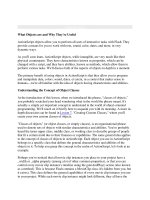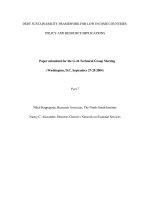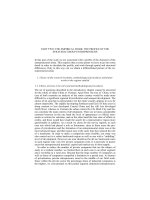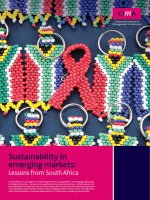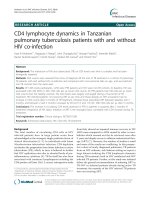Sustainability in Kansas City where we are and where we’re going ppt
Bạn đang xem bản rút gọn của tài liệu. Xem và tải ngay bản đầy đủ của tài liệu tại đây (1009.99 KB, 16 trang )
Sustainability
in Kansas City
MISSOURI
where we are and where we’re going
,
Recognizing that cities across the country are providing energy-efficient, least
polluting and healthy living spaces, The Green Guide presents the environmental
leaders, those cities whose green achievements set the standard for others.
– 2006 National Geographic Green Guide that ranked Kansas City,
Mo., 25th out of all 251 metropolitan areas with populations
of 100,000 or more, based on information from Mayors’ offices,
the Environmental Protection Agency, the U.S. Green Building
Council and other independent sources
Kansas City, Mo., might be known for its jazz history, stride piano and barbecue
sauce, but it’s also making strides in city sustainability.
– 2006 SustainLane U.S. City Ranking, “How Green is Your City?”
which ranked Kansas City, Mo., 18th in its evaluation of the 50
largest cities in the U.S.
Table of Contents
Introduction… 3
Sustainability in Kansas City, Mo., means
4
Letter from the city manager and chief environmental officer 6
City of Kansas City, Mo., programs and accomplishments 7
Regional initiatives 11
For more information 12
Web resources 13
3
Over the past two years, City of Kansas City, Mo., government leaders have directed that sustainability be
integrated into all aspects of City operations. Policies enacted by the mayor and City Council and implemented
by the city manager and City staff are having a significant impact on the quality of life in Kansas City. These
policies promote the triple bottom line goals of environmental quality, social equity and economic vitality.
The mayor, City Council and city manager are together in working to incorporate “green” into the culture
of City operations. The goal includes empowering staff with the knowledge and opportunities to make
sustainability a basic principle in how they perform their jobs. This idea is fundamental to provide the quality
of local government services that residents deserve.
Introduction:
Top-level Commitment to
Sustainability in Kansas City, Mo.
The mayor and City Council have:
• Identified being a nationally-recognized green
city as a top long-term priority
• AdoptedtheGreenSolutionsPolicy,whichdirects
City departments to incorporate green solutions
into projects, program and policies
• Adopted a Climate Protection Plan, including
goals for a 30 percent reduction in greenhouse
gas emissions community-wide and in City
government operations below year 2000 levels by
2020
• AdoptedanordinancerequiringCityconstruction
and renovation projects to achieve at minimum a
U.S. Green Building Council LEED (Leadership in
Energy and Environmental Design) Silver rating
• Adoptedanordinancerequiringhousingprojects
funded by the City (including affordable housing)
tobeconstructedtomeetfederalENERGYSTAR™
ratings to reduce energy use and utility bills
• Adopted a requirement for fact sheets that
accompany proposed ordinances to answer the
question: How will this contribute to a sustainable
Kansas City?
• AdoptedanordinanceestablishingaBicycleand
Pedestrian Advisory Committee charged with
providing recommendations to make the city
more bicycle and pedestrian friendly
• Adopted an Economic Development and
Incentives Policy, which promotes sustainability
and green building in economic development
projects receiving financial support from the City
4
“returning density to our urban core where businesses
and individuals can receive City services more
efficiently.”
Mayor Mark Funkhouser
“wise use of limited resources to improve the quality
of life for all our citizens.”
Councilwoman Deb Hermann,
1st District at large
“making the connections between the economic,
social and environmental vitality of our community.”
Councilman Bill Skaggs,
1st District
“making our City a bike and pedestrian-friendly
community.”
Councilman Russ Johnson,
2nd District
“protecting and preserving our environment for
generations to come.”
Councilman Ed Ford,
2nd District at large
…”improving waste management, including
recycling, throughout the community and conserving
energy, which will result in cost savings for the city.”
Councilwoman Melba J. Curls,
3rd District at large
“an opportunity to create a transportation system that
will help reduce emissions.”
Councilwoman Sharon Sanders Brooks,
3rd District
“preserving and strengthening our community
by reducing waste and raising efficiencies, while
protecting resources for our future.”
Councilwoman Beth Gottstein,
4th District at large
“being a national leader in the use of green
infrastructure to address the sewer and storm water
problems in our neighborhoods.”
Councilwoman Jan Marcason,
4th District
“creating green collar job opportunities for inner city
youth in their neighborhoods.”
Councilman Terry Riley,
5th District
“energy-efficient, high quality housing that is
accessible to public transit for all residents in our
community.”
Councilwoman Cindy Circo,
5th District at large
“creating a cleaner and “greener” environment,
which will lead to a stronger economy and a higher
quality of life for this generation and generations to
come.”
Councilwoman Cathy Jolly,
6th District at large
“using City resources wisely in ways that minimize
our carbon footprint while revitalizing underserved
neighborhoods.”
Councilman John Sharp,
6th District
Sustainability in Kansas City, Mo., means…
5
Making Kansas City a nationally-recognized green city can be done by building on the success of actions
already underway and implementing City and regional initiatives identified in this brochure. City government
working alone cannot achieve the goal of making Kansas City, Mo., a truly green city, nor will the goal be realized
overnight. However, with the City’s leadership and the common goals of many metro area public, private and
non-profit organizations there are tremendous opportunities to leverage resources and work together.
Based on a solid foundation of existing efforts and the City Council’s identification of “being a certifiable green
city” as its long-term priority, the City’s Green Solutions Policy and the Climate Protection Plan provide a roadmap
for making that vision a reality and for working with the many metro area partners who share this vision.
The city manager:
• Tasked the Office of Environmental Quality
and chief environmental officer with promoting
sustainability in all City government operations
and developing partnerships in the metro area to
promote sustainability as a regional priority
• Directed the chief environmental officer to work
with a steering committee of community leaders
and work groups of community stakeholders
to implement a climate protection plan (with
ambitious goals for greenhouse gas reductions
and recommended actions to achieve the goals)
• Adopted a Green Solutions Administrative
Regulation to assign responsibility and set
standards for integration of green solutions in
City operations and planning and development
processes. The regulation also created a Green
Team comprised of key department directors to
guide the process
• Held a two-day sustainability workshop for all
department directors and key senior staff to
identify strategies to incorporate sustainability
into various areas of City operations, including
purchasing, water, energy, capital projects,
policies/permits/plans and corporate culture
• Directed the Water Services Department to
develop a long-term control plan for reducing
combined-sewer overflows. The plan includes a
strategy that aggressively integrates green and
grey infrastructure into the “greenest” combined-
sewer overflow program in the U.S.
• Created new bike/pedestrian coordinator and
citywide trails coordinator positions to provide
interdepartmental coordination of infrastructure
and plans (Bike KC! and Trails KC!) to make the
city bike and pedestrian friendly
• Directed all City departments to develop and
implementOzoneActionPlanstoreduceemissions
that contribute to formation of ground-level ozone
in warm weather months
6
The City of Kansas City, Mo. has been progressive and innovative in its efforts to
implement green initiatives, which represent part of a more expansive agenda to make
Kansas City a truly sustainable city.
Our view of sustainability incorporates green programs into a broader triple bottom
line approach that simultaneously promotes social equity, economic vitality and
environmental quality. It is a foundation Mayor Mark Funkhouser, City Council and
City management have identified as a top long-term priority in making Kansas City a
national leader among local government efforts.
City staff is responding to new initiatives by developing a climate protection plan
to reduce greenhouse gas emissions, a long-term control plan for reducing sewer
overflows with extensive green infrastructure and a new development code to promote
green solutions in land use and development.
These new approaches will better serve our community and enhance the quality of
life for our residents.
The City is prepared to be a municipal leader in sustainability and work with public
and private sector stakeholders throughout our community to make the metro area
“America’sGreenRegion.”
WayneA.Cauthen
City manager
City of Kansas City, Mo.
Dennis Murphey
Chief environmental officer
City of Kansas City, Mo.
Letter from the City manager and
Chief environmental off icer
We already have a solid foundation of recent “green”
accomplishments, including City activities currently
underwayorproposed.Apartiallistincludes:
Climate protection- Kansas City, Mo., is the first city
in the Environmental Protection Agency’s four-state
region of Missouri, Kansas, Nebraska and Iowa to
adopt a climate protection plan, and has established
itself as a regional local government leader.
Greenhouse gas reductions- In preparing the
baseline inventory of greenhouse gas emissions
for City government and community-wide, it was
discovered that City government had reduced its
emissions by 6.8 percent from 2000 to 2005, while
community-wide emissions had increased 4 percent
in the same time period. The City’s greenhouse gas
reductions occurred from use of alternative fuels
in the City’s fleet and implementation of energy
efficiency measures in City buildings, water and
sewer operations, streetlights and traffic signals.
Declaration on climate change- InApril 2008,the
Kansas City International Airport joined more than
200 of the world’s airports in signing a declaration on
climate change that was signed by industry leaders
at theAviationand Environment Summitin Geneva,
Switzerland. In signing the declaration, KCI Airport
has reaffirmed its commitment to work with all players
across the industry to target carbon-neutral growth as
a step toward a carbon-free future for aviation.
Drinking water quality- Kansas City, Mo., is
recognized as having outstanding water quality.
SustainLane ranked the City No. 1 in tap water quality
among the 50 largest U.S. cities in 2006 and 2008.
Energy efficiency- Energy conservation projects in
City buildings, including City Hall and Convention
Center complexes, are estimated to save $2 million
annually in energy costs and reduce greenhouse gas
emissions by approximately 34,000 tons/year. Many
additional energy efficiency measures have been
implemented in other City department buildings. In
the City’s Water Services Department, pumps and
motors were replaced with energy efficient models to
reduce energy use.
LEED- The Kansas City Convention Center Ballroom
expansion was certified by the U.S. Green Building
Council as a LEED Silver project.
• TheCity’snewVehicleImpoundmentFacility(towlot)
is under construction. It is designed to achieve a LEED
Gold rating from the U.S. Green Building Council.
• The new Southeast Community Center was
designed to achieve a LEED Silver rating.
7
City of Kansas City, Mo.,
programs and accomplishments
LEED Silver certified Ballroom
in the Kansas City Convention Center
KansasCityInternationalAirport
8
• The proposed Black Archives historic renovation,
the new Metro Patrol Police Station and renovation
of the Robert J. Mohart MULTI-Focus Center are
designed to achieve LEED Silver ratings or higher.
• TheAviationDepartmenthascommittedtoachieving
LEED Silver standards on projects funded with
aviation funds or as tenant reimbursement projects.
Alternative fuels- In 2006, SustainLane.com rated
Kansas City No. 3 out of the 50 largest U.S. cities for the
percentage of fleet vehicles (50 percent) that operate
on alternative fuels. All City diesel vehicles use
biodiesel and 250 vehicles (including shuttle buses at
theKCIAirport)operateoncompressednaturalgas.
Wet Weather Solutions Program- Green Solutions
will be a significant component of the City’s long-
term control plan for reducing sewer overflows and
reducing stormwater runoff into area streams. The
City will be a national leader in using green solutions
as a strategy.
10,000 Rain Gardens- This nationally-recognized
initiative promotes the capture and beneficial use
of stormwater as an onsite resource at residential,
commercial and public properties. The program
includes workshops, displays at home and garden
shows, distribution of brochures and a Web site
containing garden and rain barrel information,
resources, links and latest news.
City streetlights- City streetlights have been
converted to energy-efficient, high-pressure sodium lamps.
Traffic signals- Approximately 40 percent of the
City’s traffic signals have been converted to LEDs,
which use 75–90 percent less energy and last many
thousands of hours, reducing costs of electricity and
labor costs to change bulbs. The City will continue
to convert its remaining incandescent bulb traffic
signals to LEDs.
Water Services energy efficiency- The Water
Services Department captures and reuses methane
generated from wastewater treatment to heat its
wastewater digesters and to produce a portion of
its electricity during peak demand periods. The
department also converted pumps and motors to
energy-efficient models to reduce energy use.
KC Recycles- The Solid Waste Division of the Public
Works Department collected more than 21,000 tons of
recyclable materials in fiscal year 2007. In addition to
weekly curbside collection of residential recyclables,
the City uses Bridging The Gap to operate three drop-
off recycling centers. The centers provide outlets
for residents of multi-unit housing that do not have
curbside recycling service and they accept materials
not included in the curbside collection program. In
fiscal year 2007, 5.1 million pounds of recyclables
were collected at the drop-off sites. In addition, City
facilities recycled 408,000 pounds of materials during
thesametimeperiod.TheAviationDepartment
9
provides recycling opportunities for its customers
andtheairlinesattheKCIAirport.
• In2007,theSolidWasteDivisioninitiatedaregional
and state award winning Event Recycling Program.
Solid Waste collected and mulched more than
44,000cubicyardsofleafandbrushmaterial.Atthe
City’s Three Trails Community Recycling Center,
solar panels were installed to provide clean and
green energy to the facility.
• In 2008 the City launched a pedestrian recycle
program providing curbside recycling to
pedestrian traffic in several business districts
and food waste recycling at our City Market. The
program is designed to reduce landfilling and food
waste will be used in conjunction with yard waste
collected by the City to create premium market
ready compost.
Comprehensive Solid Waste Management Plan-
The Solid Waste Division has developed a long-term
strategic plan to provide comprehensive solid waste
services in the City, including expanded recycling
by residential, commercial, City government and
construction/demolition waste generators.
Ozone action plans- During the summer, when the
Mid-America Regional Council announces Ozone
Alerts, City departments implement action plans to
reduce emissions that contribute to the formation of
ground-levelozone.Actionsincludepostponementof
mowing and outdoor painting, delaying the refueling
of vehicles until late evening or early morning, use
of transit for employee commuting and avoiding
unnecessary travel.
Nature first- Five years ago, the Parks and Recreation
Department began a program to use native plants to
reduce maintenance, pollution and erosion, provide
a diverse and sustainable habitat for wild animals
and help educate the public about benefits of native
plantings as alternative landscaping materials. In
many locations, City property has been converted
from turf to native plants.
Environmentally preferable procurement- In fiscal
year 2007, the Water Services Department purchased
10 million pounds of carbon dioxide that was a waste
product from a regional distillery and used it in its
treatment processes. The department also purchased
a significant amount of materials and treatment
chemicals that contained recycled content or were
waste by-products from other industrial processes.
• CitydepartmentspurchaseENERGYSTAR™office
equipment (that use less energy) and recycled
content materials including paper and toner
cartridges.
Playbook for green buildings and neighborhoods-
The City was a project partner with the U.S. Green
Building Council, the U.S. Conference of Mayors, a few
cities that are national leaders in climate protection
(Seattle, Portland, Ore., San Francisco, Albuquerque,
N.M., Denver, Dallas, and Grand Rapids, Mich.), the Sierra
Club and a few other organizations in developing a toolkit
(the Playbook for Green Buildings and Neighborhoods)
to assist cities in implementing their climate protection
plans. The playbook was released at the U.S. Conference
of Mayors Climate Summit in Seattle on Nov. 2, 2007.
Home weatherization and minor home repair-
The Neighborhood and Community Services
Department provides services to hundreds of low-
income households annually to reduce their energy
use and improve the quality of their homes.
Million lights- In October 2006, the City set a goal to
convert a million incandescent light bulbs to compact
fluorescent lights in the metro area in order to save
energy costs and reduce greenhouse gas emissions.
That goal has been exceeded by more than 50 percent.
Over the life of the CFLs, this will save users more than
$40 million in energy costs and reduce greenhouse
gas emissions by more than 750 million pounds.
Master trails- The City has prepared a master plan to
develop an extensive system of connecting bike and
pedestrian trails across the City.
Bike/pedestrian coordinator and citywide trails
coordinator- New positions have been created to
provide interdepartmental coordination of bike/
pedestrian infrastructure and development of trails
throughout the City ( Bike KC! and Trails KC!).
Brownfields - The City is an award-winning “Showcase
Community” for its efforts to clean up and restore idled
commecrcial and industrial property to productive use.
Since 1996, the City has secured $20 million in federal and
state funding to facilitate 36 brownfield redevelopment
projects, created 751 new jobs, retained 1,725 jobs and
stimulated $204 million in new private investment.
Urban forestry- A goal of planting an additional
120,000 trees in streetscapes and in parks was adopted
as a greenhouse gas reduction measure in the City’s
Climate Protection Plan.
Zoning and land use- Anewlyproposeddevelopment
code is under consideration that would reduce
greenhouse gas emissions and improve water quality
by promoting infill development, transit-oriented
development, greenspace preservation and bike/
pedestrian-friendly development.
Stream Buffer Ordinance- The City adopted a
stream buffer ordinance to protect the riparian
corridors of natural waterways in the city.
Building code - The City adopted the 2006 International
Energy Conservation Code standards into its building
code. This will require higher energy efficiency in all
new construction and renovation of buildings in the
city.
10
11
Regional initiatives
• The Greater Kansas City Chamber of Commerce
created the “Greater Kansas City Climate Protection
Partnership” in October 2007 to form a coalition
of area employers working together to reduce
greenhouse gas emissions and improve the quality
of life in our region. As of November 2008, they
had more than 150 members for the partnership,
including the City of Kansas City, Mo.
• A bi-state group of 18 metro area mayors jointly
signed the U.S. Conference of Mayors Climate
Protection Agreement on Nov. 2, 2007 and have
committed to work together to reduce greenhouse
gas emissions.
• MARC (Mid-America Regional Council) has
developed a regional Academy for Sustainable
Communities to provide training and tools to
promote sustainability as a regional priority.
• Sustainability workshops facilitated by Bob Mann
at Bridging The Gap’s Shadowcliff Lodge have been
attended by government officials and hundreds
of individuals from businesses and non-profits
across the metro area. The workshops promote the
potential for regional collaboration to make Kansas
City, Mo., a sustainable community.
• KansasCityPower&Lighthascommittedtobroad
implementation of energy efficiency measures to
help their customers use less energy. The company
also will generate an additional 400 megawatts of
electricity from new wind farms.
• SustainableSkylines–ThisnewinitiativebytheU.S.
EnvironmentalProtectionAgency Region 7Office
in Kansas City, Kan., will promote collaboration
by federal, state and local governments, the Mid-
AmericaRegionalCouncil,theGreaterKansasCity
Chamber of Commerce and other organizations.
The organizations are working to implement
projects in the metro region that deal with green
purchasing, solar energy projects, fleet operations,
landscaping and land management, heat island
mitigation and retrofits of off-road construction
equipment, as selected by the project partners.
Although a tremendous amount of work remains, the greening
of Kansas City is well underway. City government, other metro
area organizations and individuals are implementing aggressive
efforts to improve water and air quality, conserve energy, promote
renewable energy, reduce and recycle solid waste and reduce
greenhouse gas emissions. Consequently, as organizations such
as SustainLane and National Geographic compile their indices
of green and sustainable cities, Kansas City is in the top tier of
communities recognized for their accomplishments.
Dennis Murphey
Chief environmental officer
City of Kansas City, Mo.
12
For more information contact:
Web Resources
City of Kansas City, Mo., Climate Protection Plan
/>Wet Weather Solutions Program
/>MARCAcademyforSustainableCommunities
/>Bridging the Gap- 5 Green Things
/>US-EPA/EnergyStar
/>Playbook for Green Buildings and Neighborhoods
/>10,000 Rain Gardens Initiative and related water quality information
City of Kansas City, Mo., Home Weatherization and Home Repair Programs
/>Metropolitan Energy Center - Home Performance with Energy Star
KansasCityPower&Light-EnergySolutions
/>13
Accordingtoarecentstudy,KansasCity,Mo.,rankednumberonewiththecleanest
tap water of the 50 largest cities in the United States, and was ranked number
seven out of the fifty largest cities for Energy and Climate Change.
– 2008 SustainLane U.S. City Rankings
This project was produced by the City Communications Office
and coordinated by the director of Citywide Marketing.
Citywide marketing and City communications are a part of
the City Manager’s Office.
*printed on recycled paper with soy-based inks
